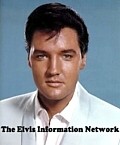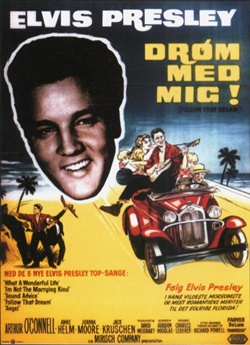Follow That Dream
- Released 50 years ago in 1962 -
- Spotlight by Harley Payette
|
Follow That Dream was Elvis’ 9th movie and although filmed after ‘Blue Hawaii’ the Elvis "travelogue formula" still hadn’t been established since Blue Hawaii wouldn’t be released until four months after filming finished in November 1961. The massive financial success of the Hawaiian movie would, unfortunately, formularise almost every Elvis film from then on.
Luckily ‘Follow That Dream’ was still a fresh chance for Elvis to try out his relaxed comedic style of acting and without the added pressure of too many soundtrack songs. Filmed almost entirely on location in Florida it is one of Elvis’ best films. In the US it was released 50 years ago this week on May 23rd 1962.
A great number of Elvis fans share an appreciation for this particular movie even though that appreciation is virtually absent from all critical texts. There are two reasons for this continued level of likeability. One of course is that Follow That Dream is a pretty good movie. The second, less obvious reason, is the fact that it says something good about human nature and that observation makes you feel a little bit better about living.
On the 50th anniversary of its release EIN contributor Harley Payette takes a fascinating look at this fan favourite.
|
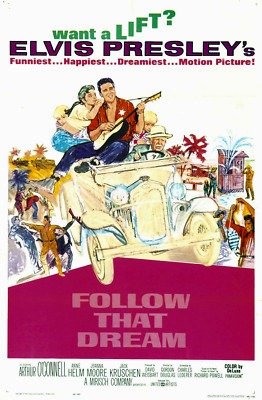 |
I first saw Follow That Dream when I was eight years old a few days after Elvis passed away. A local station was having an Elvis tribute and this was the first film they showed. The film completely captured my eight year old imagination. I can still tap into that feeling of satisfaction I got from being so thoroughly entertained.
In the thirty years that followed that August Saturday Afternoon, watching Follow That Dream has never failed to make me feel good. It’s a lot more than sentiment though that drives that feeling. I don’t feel that way about say Paradise Hawaiian Style which, at eight, I found to be grand entertainment and now I can’t even watch. I also don’t feel that way about something more reasonable than PHS like GI Blues which although mildly entertaining is just another Elvis movie to me despite the fact that I actually watched it several times when Elvis was still alive.
Over the years, I’ve found that a lot of Elvis fans share my appreciation for this particular movie even though that appreciation is virtually absent from all critical texts. Despite the lack of critical appreciation, I’ve also noticed over the years that the movie has resonated with non-Elvis fans. My first college roommate absolutely loved it, the only Elvis movie that he liked. In fact, I don’t know if I’ve ever shown it to anybody who didn’t like it. There are two reasons I think for this continued level of likeability. One of course is that Follow That Dream is a pretty good movie. The second, less obvious reason, is the fact that it says something good about human nature and that observation makes you feel a little bit better about living.
In the movie, Elvis is Toby Kwimper, the young army veteran son of ne’er do well Pop Kwimper who doesn’t really have any profession and isn’t particularly ambitious but has a tremendously good heart.
Over the years, Pop has taken in four children not related to him ranging in age from 19-year-old Holly (Anne Helm), who has an unrequited crush on the oblivious to women Toby, to toddler Ariadne.
Pop (Arthur O’Connell) had no reason to take the kids in except for the fact that their parents died and they had no place to go. |
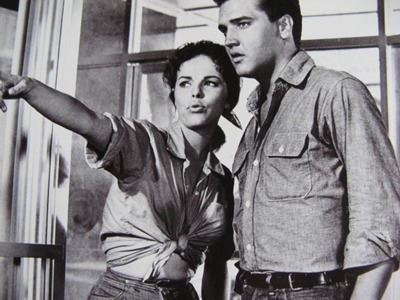 |
Pop is not exactly providing the kids with a world of opportunity or a particularly good example on how to get ahead in life. The entire family including Toby, who receives a disability pension from the army for a bad back despite being in possession of super strength, is a ward of the government. However, he does provide them with a family and a home.
The idea of where and what constitutes home is the story’s starting point. Before the story begins, the family shares some sort of rental with another unrelated woman. One day, they are out for a ride in Florida and drive down a yet to be opened road. Although the road is signed “Closed to the public,” Pop figures because he is a ward of the government that doesn’t mean him. One of the best running jokes in the movie is that Pop feels no shame in his reliance on the government because he figures his use of government aid help keeps the government in business. Perhaps libertarians out there will find more truth in that assessment than eccentricity.
The Kwimpers lack any worldliness though and take everything at face value. This results in most of the movie’s very solid humor.
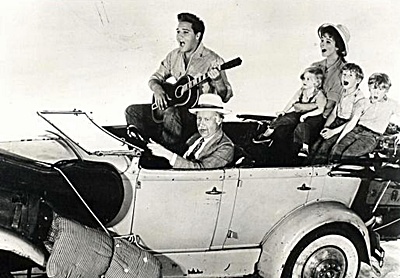
Driving down the road, Elvis and family run out of gas. Since the road is unoccupied, they are not in a position to leave and get more gas.
They camp out for an undetermined length of time until the State Highway Supervisor Arthur King (played with hateful superiority by Alan Hewitt) arrives just before the road is to be dedicated by the governor.
The land the Kwimpers are on is fill land, some kind of preserved highway not meant for human occupation. He sees the Kwimpers camped out and immediately assumes the worst.
Making an immediate class judgment, he orders the Kwimpers off the land and threatens to arrest them. |
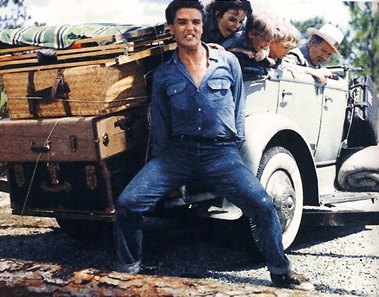 |
This infuriates Pop Kwimper who has a hot temper and a strong sense of self. He thwarts King by telling the governor that he and the family are taking advantage of Florida’s homestead law which is his legal right. At first he does this just to spite King with no intention of creating a homestead. However, Helm is desperate for a home that will belong to her just as much as the Kwimpers and gets Elvis to convince O’Connell to stay. He does this by telling Pop he should be scared of Mr. King. Pop want have any of that.
Mr. King is a pretty scary character though and has the Kwimpers welfare benefits cut off. Instead of being broken though the Kwimpers respond, thanks to the savvy intuition of Holly, by starting their own successful fishing business on their new land.
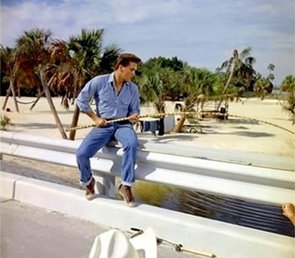 |
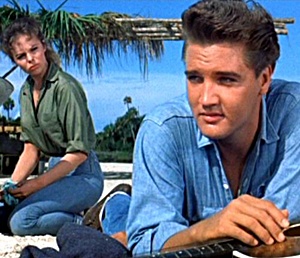 |
Mr. King is not done though and gets a state welfare advisor (Joanna Moore) with a case of the hots for Toby, to try and take the kids away. The Kwimpers also have to deal with gangsters (Simon Oakland and Jack Kruschen) who want to use the new land, too new to be subject to local law enforcement, to set up a gambling Mecca.
Good natured Toby is able to navigate the family’s way through all these pitfalls. Having won their battles, the now mature Holly and Toby decide to get together. Close curtain.
The journey to that moment is much more enjoyable than that summary suggests filled with many smiles and several laugh out loud moments including Elvis’ misinterpreted trip to the bank. This is because for one of the very few times in Elvis’ movie career, Elvis was given a very first rate screenplay by Charles Lederer. Working from a novel by Richard Powell (who was pleased with the film), Lederer crafted a screenplay rich in character based humor and some of the sharpest dialogue in any Elvis film. This may not sound like much of a compliment but there are some classic comic duo type exchanges here.
Gangster- “This is a traveling game. We stay around a few months until it gets too hot and then we move away.”
Toby- “They tell me around here it don’t get hot until the middle of July.” (Remember he’s a literalist.)
Gangster- “Well it get hot anywhere for us.”
Toby- “Well, if it gets hot anywhere, what’d you come here for?”
Gangster- “Well, it was on the way.”
Beyond the dialogue Lederer’s script is filled with many sharp observations about the human condition. One of the sharpest is in the depiction of the bureaucrat Arthur King. King’s highway project is a good one and you can see how even a small neighborhood could thwart it. King though has lost site of the purpose of project like this which is to serve the people and “the people” include drifters like the Kwimpers. The fact that he treats the family like garbage from the start makes it evident that the highway project is for him more about self-glorification than public service. The public only exists for him as a nameless mass in appreciative thrall to his good work.
The Kwimpers themselves represent an interesting statement. Some have felt because of the laughs generated by the Kwimpers’ literalism and their dependence on public programs, that the script disparages them. That is far from the truth. The script has the utmost respect for the family and makes the point that although they’ve drifted through most of their lives, given something to fight for and opportunity, they excel.
The script makes the subtle point that the aimless rhythms, comforts, predictability and lack of opportunity of modern life have made us soft and un-ambitious. Only when provided challenge and opportunity can we and our surrogates the Kwimpers become our best selves.
The reason why the Kwimpers, particularly Toby, excel gives the film its special pop and is the reason why I love it. The defining trait of the family is its decency. Toby’s character is in unable to see bad in anyone. When a gang of hit men come to wipe him out with a car full of guns, he assumes they are a bunch of drunks on a hunting trip. This is because of Toby can’t conceive of the fact that someone would kill another person for money. His equally decent father can’t even bring himself to steal a checker in a game with his son.
That decency is in the end what makes the Kwimpers soar over all their problems. They get the loan to start their business because of their honesty. They win the court case that wins back the kids because of Toby’s honesty and true love for his father and family.
By the end of the film, we have a lot of the same feelings towards the Kwimpers that Roland Winters’ judge does when he gives the family a little tribute in court. Surrounded by people who look for and see the worst in others, the Kwimpers thrive, despite all kinds of obstacles, because they consistently see the best in others and themselves. It’s a great message that leaves you feeling hopeful about being alive.
Lederer’s fine script is more than ably served by Gordon Douglas’ sharp direction. Douglas and his cinematographer have created a film that is a joy to look at with much of the action framed on gorgeous Florida rural beach locations. More importantly Douglas keeps the action moving with unobtrusive but sharp camera movements and solid pacing.
Best of all Douglas gets first rate performances out of his entire cast populated with terrific character actors like Kruschen, Oakland, and Hewitt. His three leads are especially appealing. Two time Academy Award nominee O’Connell oozes the same kind of gentle humor and folksiness he brought to dozens of other roles. His “Hell ain’t got not fury,” pronouncement in the courtroom is a scream.
Helm, who played in virtually no other big league films, gives Holly the perfect balance of sweet vulnerability and awakening sexual awareness demanded by her character. |
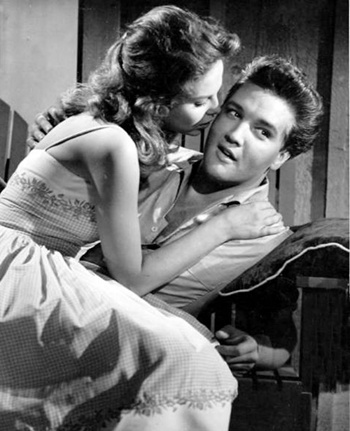 |
It’d be tough to say that Elvis is that much better than his fellow cast mates but that’s only because everyone is so good. However, he is asked to do more, carry the picture, so he deserves special mention.
Along with 1958’s King Creole this is probably the best acting that Elvis ever did on screen. To some that may not seem to be much of a compliment but he is very good here. He does carry the movie.
This is especially important because Toby is a not an easy role to play. It’s not a super complex role; Elvis finds the right tone and sticks with it but finding that tone though must have been tough because while Toby is a complete innocent, he is not stupid. The character has a strong survival instinct and is even a bit of a philosopher. If Elvis mugs even a little bit as Toby, that aspect is lost. This is important also because Toby’s humor is in the writing. It does not need mugging.
Elvis does not mug here. He is all suggestive understatement. He is especially strong at conveying Toby’s awareness of his limitations. When he is an awkward situation, he gives Toby a little awkward half laugh. |
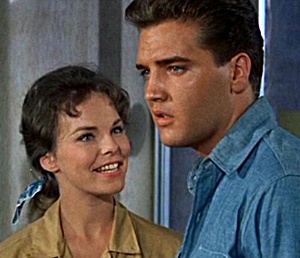 |
He also provides Toby’s sense of happiness in being alive. This is especially important in the scene where he and Helm apply for a loan. Elvis’ voice goes a little higher with childish pride when he claims “We own our john” redeeming the attempt at bathroom humor (unfortunately one of the flaws in Lederer’s script). He also provides some other blink and miss it insights like his patronizing smiling after a man pays him $20 for a fish or his nods of assent at pop’s goofy pronouncements.
When it comes time to go dramatic in the big court room speech, Elvis delivers with the kind of sincerity and passion that marked his singing. His fidgety body movements convey Toby’s unfamiliarity with making long speeches, but the conviction in his words conveys Toby’s belief.
Elvis’ outsized persona in no way intrudes on this performance. Elvis lives within Toby’s personality. For one of the few times in his film career, Elvis is subsumed within a character. Even his singing scenes are performed with self-effacing modesty.
The film is not flawless. The structure of the story is episodic and the editing could be sharper. When the film moves to gangsters to King and back again, the flow from one story to another is not natural. We literally jump from the gangsters’ trailer burning down to the kids being taken away. The juxtaposition is too harsh. The tone is also a little different on the two tracks. The humor in the gangster part of the story is more broad than the down to Earth observation of human behavior in the King/social worker conflict.
Also for a modern audience, I don’t know if the Kwimpers’ innocence plays especially well. In today’s technological world, even the poorest Americans possess knowledge of a wide variety of arcane and worldly topics. It may be a leap for a contemporary young audience to accept a character that has never set foot inside a bank and certainly a leap to accept a man in his ’20s who doesn’t know about sex. If they are willing to accept that this is a different era lived with different standards, everything should be fine. I can’t guarantee though that today’s kids, who won’t even consent to a cut longer than 30 seconds, will be willing to make that leap.
Those willing to take the journey may have some problems with the music. Elvis only sings five songs in the film but only two of them are good- the title track and the exquisite ballad “Angel” that climaxes the film.
The presentation of the music is equally spotty. If there is a flaw in Elvis’ performance it’s that, except for “Angel”, his lyp synching is poor. When he sings the good title song the presentation is especially flat with Elvis rolling on his back and playing with sand. It’s true to the character but not a good musical presentation.
|
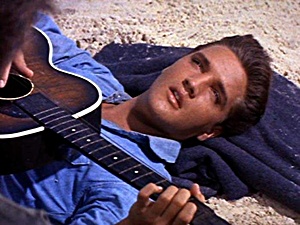 |
Oddly enough on the bad songs the presentation is pretty good. “What a Wonderful Life” is good enough to pass time behind the opening credits. And “Sound Advice”, which definitely occupies the bottom tier of Elvis songs, is given a charming presentation. Presented as a family sing along with O’Connell doing some lame but fatherly dancing, the kids clapping and the beauty of Elvis’ voice even on this weak song, it’s easy to enjoy the moment and forget the musical deficiencies.
Unlike most Elvis movies, this one would not suffer especially if all Elvis’ songs were cut. It is worth noting though that singing does add to Toby’s affability and personal warmth.
In spite of its deficiencies, Follow That Dream is a first rate entertainment and one of the relatively few Elvis films that fans and non-fans can watch without embarrassment or apology.
Spotlight / Review by Harley Payette.
-Copyright EIN May 2012
EIN Website content © Copyright the Elvis Information Network.
Please DO NOT copy & paste EIN articles to other sites
Click here to comment on this article
Read EIN's Follow That Dream soundtrack FTD CD review here
A series of 'Follow That Dream' cinema lobby cards
|
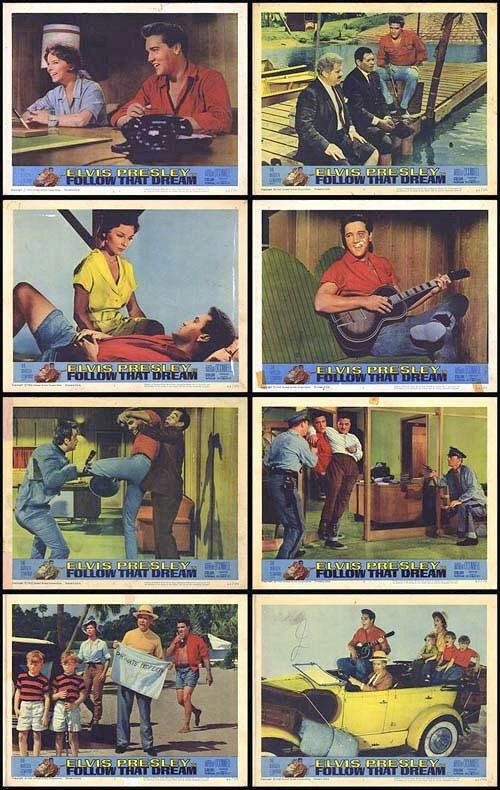 |
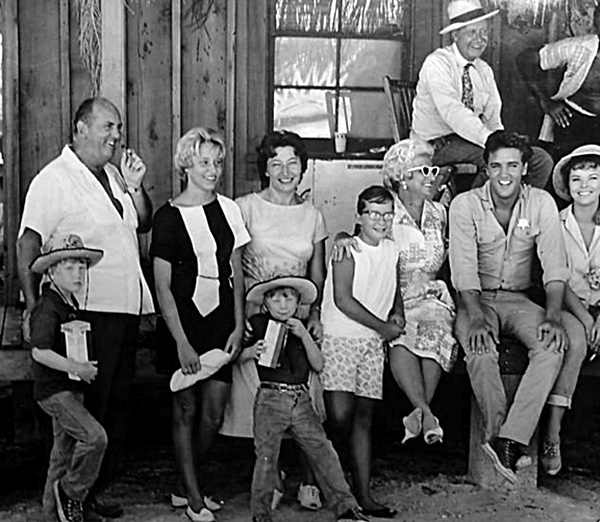
On the Follow That Dream set with Colonel Parker
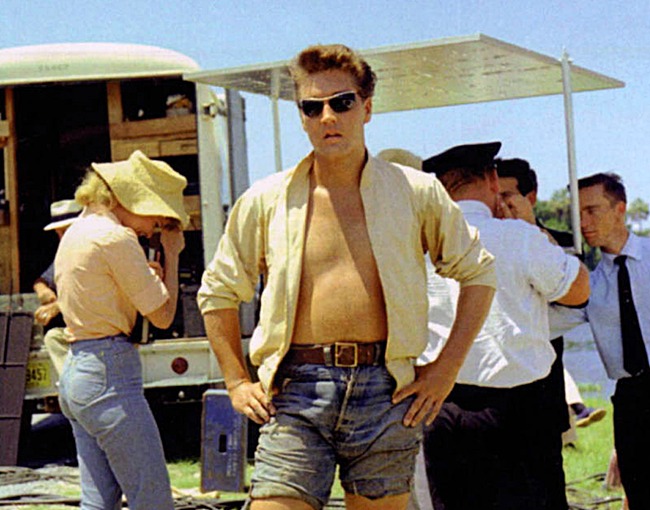
EIN Website content © Copyright the Elvis Information Network.
Elvis Presley, Elvis and Graceland are trademarks of Elvis Presley Enterprises.
The Elvis Information Network has been running since 1986 and is an EPE officially recognised Elvis fan club.
|



